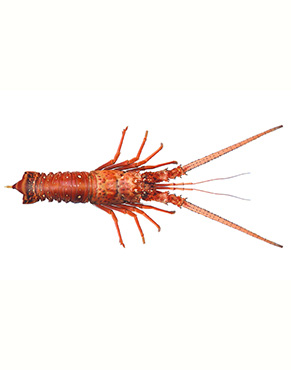How This Helps
• Lobsters belong to the family of marine crustaceans and have gained wide popularity as tasty and healthy seafood.
• Lobsters are a significant source of protein (about 28% of daily requirements) and contain only 130 calories (1 cup) of nutrition.
• Lobsters are rich in minerals like sodium, potassium, calcium, phosphorous and magnesium.
Instructions
Characteristics:
• Lobsters generally reside in crevices or in burrows on the sea floor.
• They have a muscular tail and five pairs of legs, with the first three pairs having claws. The claws on the first pair of legs are much bigger than the others.
• Their body is covered with a hard shell that extends from their head to the thorax and this shell needs to be cracked open before eating.
Nutrition Facts:
Nutritional value per 1 lobster (150 g).
Nutrients Amount
Proteins 28.2 g
Water 115 g
Ash 3.3 g
Carbohydrates 0.7 g
Cholesterol 142 mg
Calories 135
Fats & Fatty Acids
Total Fat 1.3 g
Saturated Fat 0.3 g
Monounsaturated Fat 0.4 g
Polyunsaturated Fat 0.2 g
Vitamins
Vitamin A 105 IU
Vitamin E 2.2 mg
Vitamin K 0.2 mcg
Riboflavin 0.1 mg
Niacin 2.2 mg
Vitamin B6 0.1 mg
Folate 13.5 mcg
Vitamin B12 1.4 mcg
Pantothenic Acid 2.4 mg
Choline 121 mg
Minerals
Calcium 72 mg
Iron 0.4 mg
Magnesium 40.5 mg
Sodium 216 mg
Potassium 413 mg
Phosphorus 444 mg
Zinc 4.5 mg
Copper 2.5 mg
Manganese 0.1 mg
Selenium 62.1 mcg
Source: USDA National Nutrient data base SR-21.
Health Benefits for Medical Condition:
Eyes | Cancer | Heart Diseases | Anemia | High Cholesterol | Obesity | Arthritis | Bones | Teeth | Brain | Boosts immunity |
Use It In
• Lobsters can be cooked in a number of ways like boiling, baking, grilling or by steaming.
• They are eaten in form of lobster rolls, salads, and soups.
Pairs With
Due to its mild flavor, lobsters pair best with corn, tomato, potato, asparagus, broccoli, carrots, peas, black beans, green beans, pasta, rice, risotto. It can also be served with other seafood like shrimps, scallops or salmon and provide lot of nutrition and health benefits for patients suffering from certain medical conditions.
Caution
• Lobsters have high sodium and cholesterol content. If you are suffering from high blood pressure or high cholesterol levels, it is best to avoid this food.
• Avoid cooking lobster with high amounts of butter or mayo. Instead, cook it by steaming or boiling. Make it an occasional treat rather than including it in your regular diet.
Science and Research
Heart:
Lobsters are rich in omega-3-fatty acids, thereby making them beneficial for your heart. These compounds help to reduce arrhythmias which can cause sudden strokes or deaths. Besides, lobster is rich in selenium which prevents the cholesterol oxidation and helps prevent heart diseases.
Bones:
Lobsters are fortified with minerals like calcium and phosphorous which form the compound hydroxyapatite, which is a dense material in your bones. They improve your skeletal health thus preventing diseases like osteoporosis, osteoarthritis, rheumatoid arthritis etc. Calcium also helps to improve the nerve cells in your brain and phosphorous improves the cellular membrane structure.
Brain:
Lobsters provide you with choline and Vitamin B12, which improve your brain function. Choline helps in the development of neurotransmitters that are responsible for communication in your brain while vitamin B12 helps to maintain the myelin sheath which coats your nerves.







